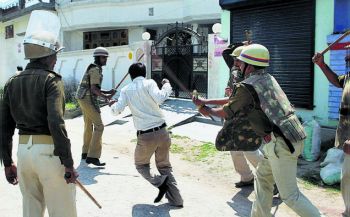 Lucknow, Sep 15: Muzaffarnagar district was hit by fresh violence on Saturday in which two people suffered serious injuries even as tension simmered in rural areas of Saharanpur and Meerut districts after more bodies were recovered from Ganga canal.
Lucknow, Sep 15: Muzaffarnagar district was hit by fresh violence on Saturday in which two people suffered serious injuries even as tension simmered in rural areas of Saharanpur and Meerut districts after more bodies were recovered from Ganga canal.
Armed men numbering about 50 opened fire at a group of people in a forested area in Phugana locality in the district on Saturday. Two persons sustained serious injuries in the firing and were admitted to hospital while others managed to escape, according to police sources here. Tension flared up in the area after the firing and security personnel in strength were deployed to prevent any reaction, sources said.
Tension also simmered in the neighbouring Saharanpur district after an attack on a youth. In Meerut, tension prevailed following killing of a youth a couple of days back. Two bodies were recovered from the Ganga canal in Muzaffarnagar and one in Meerut district taking the number of dead in the communal violence to 47.
Police officials said that the situation was improving fast in Muzaffarnagar town and day curfew had been lifted. “We are now focusing on the rural areas”, the officials said.
They said that pickets had been deployed in over 500 villages.
“The cops have been directed to hold meetings with the people in the villages and seek their help in maintaining peace”, the officials added.
The district authorities did not want to take any chance with the law and order situation in view of the scheduled visits of Chief Minister Akhilesh Yadav on Sunday and Prime Minister Manmohan Singh on Monday.Congress chief Sonia Gandhi and party vice-president Rahul Gandhi were also likely to visit Muzaffarnagar next week, sources said.
The trouble had sparked off allegedly after a member of a particular community was beaten to death by a frenzied mob during a meeting, organised to protest the killing of two youths by members of a particular community on August 27 at Kaval village in the district.






Comments
Add new comment